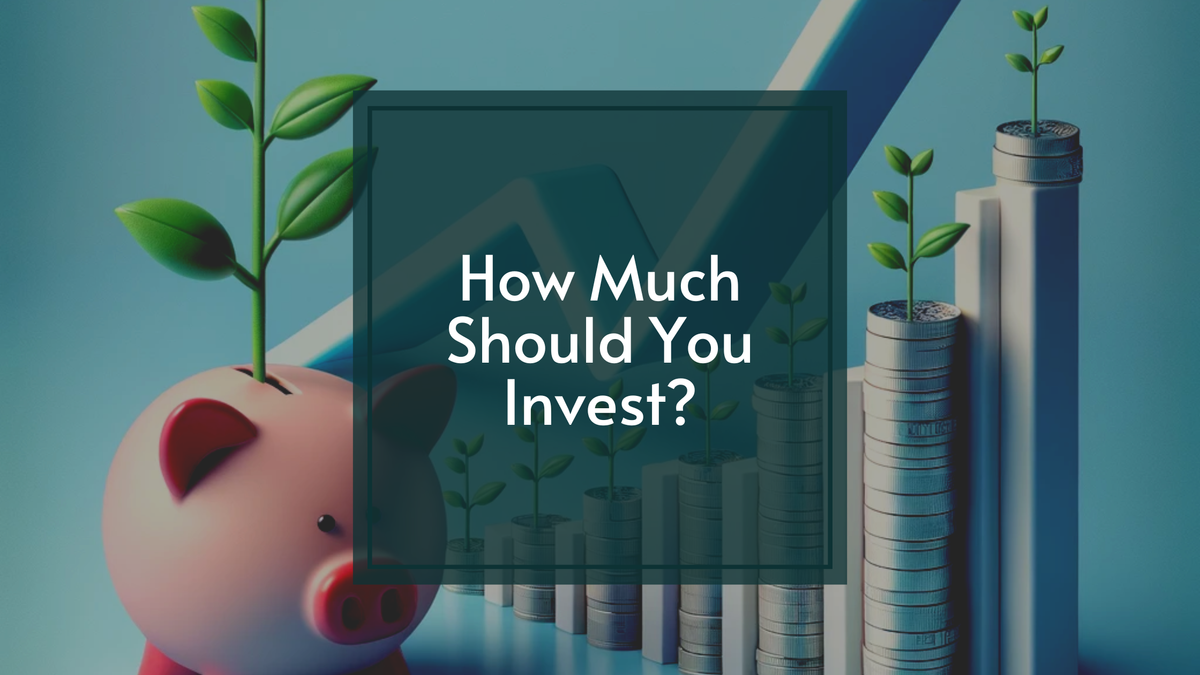How Much Should You Invest?
Thinking about how much to invest can be a stumbling block, but it shouldn't be. In today's economic climate, where the UK's inflation rate has hit 6.7%, leaving your money in the bank could mean losing out.

Trying to figure out how much to invest can be an big stumbling block when starting your wealth journey, but it shouldn't be. In today's volatile economic climate, leaving your money in the bank could mean losing out to inflation. Investing, whether modest or substantial, is a pivotal step toward securing your financial future. With options available for every budget, from £10 to £1,000, let's explore the right investment path for you.
Understanding Monthly Budgeting
Your journey begins with budgeting. This crucial step helps you gauge your disposable income after covering all essential expenses. A widely recognized guideline is the 50/30/20 budget rule, which suggests allocating 50% of your income to necessities, 30% to wants, and 20% towards savings, investments, and debt repayment.
The Need for a Personalised Approach
For a more accurate assessment, a detailed analysis of your cash flow position is essential. This involves scrutinizing your income sources, fixed and variable expenses, and any existing financial obligations. This in-depth approach reveals a clearer picture of your actual disposable income, allowing for more informed investment decisions.
Evaluating Emergency Funds
Recent data suggests that while the average UK adult has £17,365 in savings, a concerning 34% have less than £1,000 set aside for emergencies. An ideal emergency fund covers about three months’ worth of expenses, a goal that many find challenging.

Considering Investment Timeframe and Risks
Your investment horizon should mirror your financial goals and risk tolerance. Longer investment periods typically accommodate higher risk levels, potentially leading to greater returns through the power of compounding interest. Understanding the spectrum of investment risks is vital. You need to know what could go wrong with each investment type. It’s about finding that balance in your portfolio that aligns with your comfort with risk and investment objectives.
A Deeper Dive into Risk Appetite
Risk appetite varies greatly among individuals. It's influenced by factors like your age, financial responsibilities, income stability, and personal comfort with uncertainty. An in-depth understanding of your risk tolerance is crucial in crafting a portfolio that reflects your actual financial personality and goals.
Final Thoughts
Starting small is key. Invest with the smallest amount you're comfortable with and plan for gradual growth. The investment landscape offers countless opportunities suitable for all budgets. The crucial part is taking that first step. If navigating these choices or understanding the current economic landscape feels daunting, professional guidance can make a significant difference.
A financial planner can offer tailored advice, considering your unique financial situation, goals, and risk tolerance. They can help you navigate beyond the 50/30/20 rule, crafting a financial plan that resonates with your personal and financial aspirations.
Further Resources
For readers interested in further exploring the topics of personal finance, investing, and financial planning, the following books can be highly beneficial:
- "The Total Money Makeover" by Dave Ramsey: This book offers a straightforward and effective approach to managing personal finances, focusing on eliminating debt and building wealth through practical strategies.
- "Your Money or Your Life" by Vicki Robin and Joe Dominguez: This classic book on personal finance emphasizes the relationship between money and values, encouraging readers to transform their relationship with money and achieve financial independence.
- "The Intelligent Investor" by Benjamin Graham: A must-read for those interested in investing, this book provides foundational knowledge on value investing and managing investment risks.
- "The Psychology of Money" by Morgan Housel: This book offers insightful perspectives on how personal beliefs and behaviors affect financial decisions. It delves into the psychological aspects of money management, investing, and wealth accumulation.
- "I Will Teach You to Be Rich" by Ramit Sethi: Aimed at a younger audience, this book provides a six-week program that covers banking, budgeting, saving, and investing, with a focus on setting up a "rich life."
These books offer a range of perspectives and strategies, from budgeting and saving to investing and wealth building, providing valuable resources for anyone looking to enhance their financial literacy and management skills.
